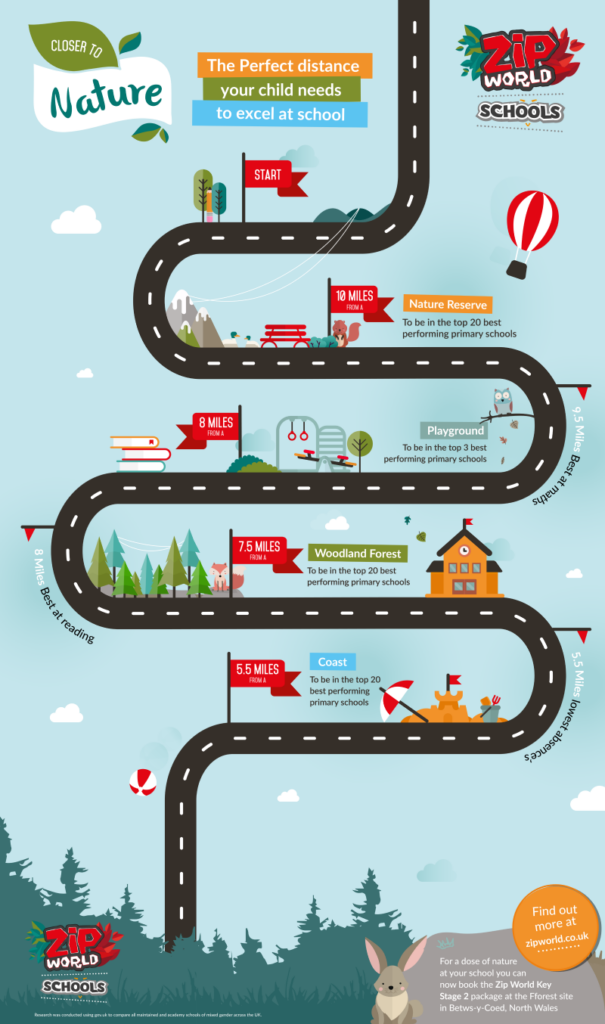Study reveals the perfect balance of nature for the best school performance

A new study has revealed the perfect proximity to nature that your child will need to succeed at school.
The study undertaken by ZIP WORLD looked at the top 20 best performing primary schools in the UK courtesy of GOV.UK and has revealed the perfect balance of nature required to be one of the best performing pupils in the country.
According to the data, primary school children need to be within 10 miles of a nature spot to be within one of the top three performing schools in the country, be it a beach, woodland or nature reserve or recreation ground or park.
The study comes as ZIP WORLD, one of North Wales’s biggest tourist attractions, with three sites across the Snowdonia National Park and recently voted ‘Best Activity Day Out’ by Day Out with the Kids, launches their brand-new educational programme. The package invites teachers to escape the classroom and bring lessons to the great outdoors.
The study revealed that for a primary school to appear in the top 20 best in the country it needs to be located within an average of 11.5 miles from the coastline, or water-based leisure activity, within 10 miles of a nature reserve or national park, within 7.5 miles of a forest or woodland trail and within 2 miles to a playground or recreation ground.
The results also drill down further to see what it takes to appear in the top three of best performing primary schools in the country and showed that a school needs to be located within an average of 5.5 miles from water-based fun and leisure, within 8.5 miles to a nature reserve or area of natural beauty, within 9 miles of a forest and 8 miles from a playground.
The study also showed the ‘perfect’ overall distance to nature needed to excel at reading (8 miles), maths (9.5 miles) and overall performance (5.5 miles). It also revealed that schools with the lowest absence rates were within 10 miles of accessible nature.
Zip World hold the Learning Outside the Classroom accreditation from the Council for Learning Outside the Classroom (LOtC) which was incorporated in December 2008 and has since awarded over 1,000 providers with the badge. Organisations who hold the badge are recognised as providing good quality educational experiences. The Zip World educational programme promises to get children learning in the elements and taking in the sites of Zip World’s naturally amazing settings.
Educational professionals are becoming increasingly conscious of the effect nature can have on a child’s learning and development as well as health and well-being. And in an increasingly tech-oriented environment, schemes like this are welcomed.
Emily Marchant PhD Researcher in Medical Studies, Swansea University and co-author of a recent outdoor learning study commented on the scheme ‘Education is not just about lessons within the four walls of a classroom. Outdoor learning provides the opportunity to take lessons outside and engage children with the natural environment. Our research study exploring pupils, teachers and headteachers’ views of embedding regular outdoor learning within the curriculum highlighted a huge range of benefits to children’s learning and well-being.
Children felt a sense of freedom when outside the restricting walls of the classroom. They felt more able to express themselves and enjoyed the opportunity to be physically active. They also said they felt more engaged and were more positive about the learning experience. In addition, we also heard many say that their well-being and memory were better.
Teachers also discussed the different approach to lessons, and how it helped engage all types of learners. Importantly, the teachers spoke of increased job satisfaction, and that they felt that it was “just what I came into teaching for”. Teaching doesn’t need to follow a rigid classroom format – a simple change like going outside can have tremendous benefits.’




